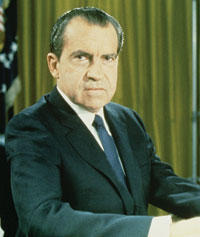Richard M. Nixon

thirty-seventh U.S. PresidentPeople have got to know whether or not their president is a crook. Well, I'm not a crook. I've earned everything I've got. On November 17, 1973, President Richard M. Nixon gave a televised press conference in which he denied his involvement in the Watergate cover-up, despite recent congressional testimony by former White House legal counsel John Dean to the contrary. The embattled president also spoke of his questionable tax record and the subpoena of the Watergate tapes--official recordings of White House conversations expected to prove that Nixon was guilty of criminal activity. The Watergate affair began when a break-in at the Watergate Hotel by White House officials was uncovered by journalists and the Senate Select Committee on Presidential Campaign Activities, and then escalated when President Nixon attempted to use executive privilege as justification for suppressing investigation of the incident. On July 16, 1973, a former White House aide brought the existence of the Watergate tapes to the attention of the Senate committee investigating Watergate, and on July 26, the recordings were subpoenaed. Nixon failed to comply with the subpoena, and on August 9, the Senate committee filed suit against the president. Finally, on October 23, Nixon agreed to turn over the tapes to a District of Columbia court, but when the recordings arrived, several of the key tapes were missing, and an eighteen-and-a-half-minute gap was discovered on another. The White House failed to satisfactorily explain the long silence during a key conversation between Nixon and White House staff member H. R. Haldeman, although an expert later testified that the gap had been caused by deliberate and repeated erasures. On July 24, the Supreme Court rejected Nixon's claims of presidential privilege as unconstitutional, and ordered him to honor the special prosecutor's subpoenas. On July 30, the same day that the House of Representatives voted three articles of impeachment against him, Nixon finally sent the Watergate tapes to the Capitol. On August 5, transcripts of the recordings were revealed, including a segment in which the president was heard instructing Haldeman to order the FBI to halt the Watergate investigation. Four days later, Richard M. Nixon became the first president in U.S. history to resign. On September 16, he was pardoned from any criminal charges by his successor, President Gerald Ford.

0 Comments:
Post a Comment
<< Home